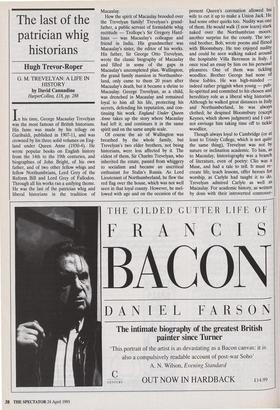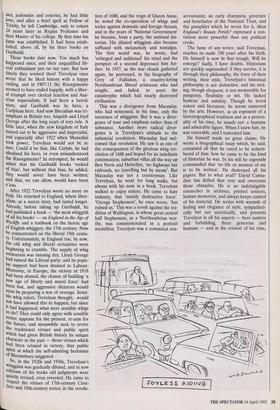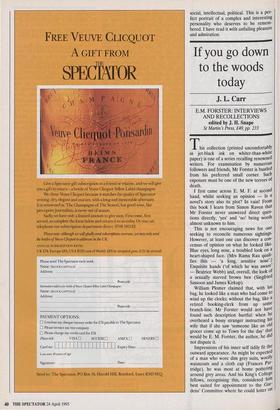The last of the patrician whig historians
Hugh Trevor-Roper
G. M. TREVELYAN: A LIFE IN HISTORY by David Cannadine HarperCollins, £18, pp. 288 In his time, George Macaulay Trevelyan was the most famous of British historians. His fame was made by his trilogy on Garibaldi, published in 1907-11, and was crowned by his three solid volumes on Eng- land under Queen Anne (1930-4). He wrote popular books on English history from the 14th to the 19th centuries, and biographies of John Bright, of his own father, and of two other fellow whigs and fellow Northumbrians, Lord Grey of the Reform Bill and Lord Grey of Fallodon. Through all his works ran a unifying theme. He was the last of the patrician whig and liberal historians in the tradition of
Macaulay.
How the spirit of Macaulay brooded over the Trevelyan family! Trevelyan's grand- father, a public servant of formidable whig rectitude — Trollope's Sir Gregory Hard- lines — was Macaulay's colleague and friend in India. His grandmother was Macaulay's sister, the editor of his works. His father, Sir George Otto Trevelyan, wrote the classic biography of Macaulay and filled in some of the gaps in Macaulay's uncompleted plan. Wallington, the grand family mansion in Northumber- land, only came to them 20 years after Macaulay's death, but it became a shrine to Macaulay. George Trevelyan, as a child, was drenched in Macaulay and remained loyal to him all his life, protecting his secrets, defending his reputation, and con- tinuing his work. England Under Queen Anne takes up the story where Macaulay had left it, and continues it in the same spirit and on the same ample scale.
Of course the air of Wallington was breathed by the whole family, but Trevelyan's two elder brothers, not being historians, were less affected by it. The eldest of them, Sir Charles Trevelyan, who inherited the estate, passed from whiggery to socialism and became an uncritical enthusiast for Stalin's Russia. As Lord Lieutenant of Northumberland, he flew the red flag over the house, which was not well seen in that loyal county. However, he mel- lowed with age and on the occasion of the
present Queen's coronation allowed his wife to cut it up to make a Union Jack. He had some other quirks too. Nudity was one of them. He would walk (I now learn) stark naked over the Northumbrian moors: another surprise for the county. The sec- ond brother, Bob, wrote poems and flirted with Bloomsbury. He too enjoyed nudity and could be seen walking naked around the hospitable Villa Berenson in Italy. I once read an essay by him on his personal pleasures. One of them was tickling woodlice. Brother George had none of these foibles. He was high-minded — indeed rather priggish when young — pub- lic-spirited and commited to his chosen and hereditary role as a liberal whig historian. Although he walked great distances in Italy and Northumberland, he was always clothed; he despised Bloomsbury (except Keynes, which shows judgment) and I can- not envisage him taking time off to tickle woodlice.
Though always loyal to Cambridge (or at least to Trinity College, which is not quite the same thing), Trevelyan was not by nature or inclination academic. To him, as to Macaulay, historiography was a branch of literature, even of poetry: Clio was a Muse, and had a tale to tell. It must re- create life, teach lessons, offer heroes for worship, as Carlyle had taught it to do. Trevelyan admired Carlyle as well as Macaulay. For academic history, as written by dons with their introverted controver- sies, jealousies and coteries, he had little love, and after a brief spell as Fellow of Trinity, he left Cambridge, only to return 24 years later as Regius Professor and then Master of his college. By that time his fame was established. It had been estab- lished, above all, by his three books on Garibaldi.
Those books date now. Too much has happened since, and their unqualified lib- eral enthusiasm jars on our ears. But how timely they seemed then! Trevelyan once wrote that he liked history with a happy ending, and in 1907-11 the Risorgimento seemed to have ended happily, with a liber- al triumph over clerical reaction and Aus- trian imperialism. It had been a heroic stem and Garibaldi was its hero, a Carlylean hero. And now liberalism was tri- umphant in Britain too; Asquith and Lloyd George after the long years of tory rule. A little later, when the new kingdom of Italy turned out to be aggressive and imperialist, and especially after 1922 when Mussolini took power, Trevelyan would not be so sure. Could it be that, like Carlyle, he had idealised his hero, or even misunderstood the Risorgimento? In retrospect, he would admit that his Garibaldi books 'reeked of bias', but without that bias, he added, they would never have been written; and that, we can allow, would have been a loss.
After 1922 Trevelyan wrote no more on Italy. He returned to England, where liber- alism, as a sucess story, had lasted longer. Already, before taking up Garibaldi, he had published a book — 'the most whiggish of all his books' — on England in the Age of IfYchffe and a textbook on the heroic age of English whiggery, the 17th century. Now he concentrated on the liberal 19th centu- 'Y. Unfortunately, in England too, by now, the old whig and liberal certainties were beginning to crumble. The supply of whig aristocrats was running dry; Lloyd George had ruined the Liberal party; and its popu- lar support had been drained to Labour. Moreover, in Europe, the victory of 1918 had been abused, the chance of building 'a new age of liberty and moral force' had been lost, and aggressive dictators would soon be preparing a war of revenge. Sensi- ble whig rulers, Trevelyan thought, would not have allowed this to happen; but since it had happened, what were sensible whigs to do? They could only agree with sensible Writs: appease for the present, re-arm for the future, and meanwhile seek to revive the traditional virtues and public spirit which had given British history its unique character in the past — those virtues which had been relaxed in victory, that public spirit at which the self-admiring hedonists of Bloomsbury sniggered. So, in the 1920s and 1930s, Trevelyan's whiggism was gradually diluted, and in new editions of his books old judgments were quietly revised, even reversed. He came to respect the virtues of 17th-century Cava- liers and 19th-century tories; in the revolu- tion of 1688, and the reign of Queen Anne, he noted the co-operation of whigs and tories against domestic and foreign threats, and in the years of 'National Government' he became, from a party, the national his- torian. His diluted whiggism also became suffused with melancholy and nostalgia. The first world war, he wrote, had `enlarged and saddened' his mind and the prospect of a second depressed him fur- ther. In 1937, as the war clouds gathered again, he portrayed, in his biography of Grey of Fallodon, a country-loving Northumbrian liberal aristocrat who had sought, and failed, to avert the catastrophe which had nearly destroyed civilisation.
This was a divergence from Macaulay, who had witnessed, in his time, only the successes of whiggism. But it was a diver- gence of tone and emphasis rather than of substance. Another more radical diver- gence is in Trevelyan's attitude to the industrial revolution. Macaulay had wel- comed that revolution. He saw it as one of the consequences of the glorious whig rev- olution of 1688 and hoped for its indefinite continuation; suburban villas all the way up Ben Nevis and Helvellyn, `no highways but railroads, no travelling but by steam'. But Macaulay was not a countryman. Like Trevelyan, he went for long walks, but always with his nose in a book. Trevelyan walked to enjoy nature. He came to hate industry, that 'mainly destructive force'. `George Stephenson', he once wrote, 'has ruined us.' This was a revolt against the tra- dition of Wallington, in whose great central hall Stephenson, as a Northumbrian wor- thy, was commemorated in a portrait medallion. Trevelyan was a commited con- servationist, an early champion, governor and benefactor of the National Trust, and the pamphlet which he wrote for it, Must England's Beauty Perish? expressed a con- viction more powerful than any political credo.
The fame of any writer, said Trevelyan, reaches its nadir 100 years after his birth. He himself is now in that trough. Will he emerge? Sadly, I have doubts. Historians are quickly superseded: if they survive, it is through their philosophy, the force of their writing, their style. Trevelyan's historical philosophy is not distinctive, and his writ- ing, though eloquent, is not memorable for pungency, flexibility or wit. He lacked humour and subtlety. Though he loved nature and literature, he seems unmoved by the arts. However, as an exponent of a historiographical tradition and as a person- ality of his time, he stands out: a humane and admirable figure. When I knew him, he was venerable, and I venerated him.
He himself made no great claims. He wrote a biographical essay which, he said, contained all that he cared to be remem- bered of him: how he came to be the kind of historian he was. In his will he expressly commanded that `no life or memoir of me is to be written'. He destroyed all his papers. But to what avail? David Canna- dine has defied that veto and overcome those obstacles. He is an indefatigable researcher in archives, printed sources, human memories, and always keeps control of his material. He writes with warmth of feeling and elegance of style, sympatheti- cally but not uncritically, and presents Trevelyan in all his aspects — here austere and forbidding, there generous and humane — and in the context of his time,
social, intellectual, political. This is a per- fect portrait of a complex and interesting personality who deserves to be remem- bered. I have read it with unfailing pleasure and admiration.




























































 Previous page
Previous page